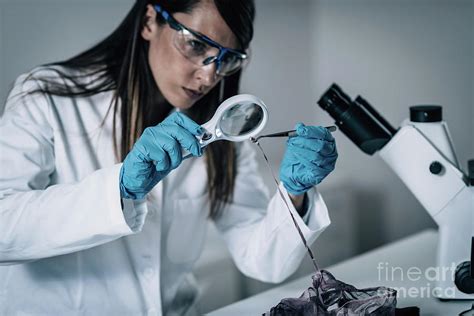Have you ever been intrigued by the world of crime scene investigation and forensic science? In today’s blog post, we will be delving into the fascinating and crucial role of forensic scientists in unraveling criminal evidence. From collecting and preserving physical evidence to analyzing fingerprints and DNA samples, forensic scientists play a vital role in solving and preventing crimes. Join us as we explore the diverse skill set and expertise required to excel in crime scene investigation, as well as the advanced forensic technologies and techniques utilized in modern forensic science. We will also discuss the importance of continuing education for forensic scientists and the various avenues for specialization within this field. Whether you are considering a career in forensic science or simply have a keen interest in the subject, this blog post will provide valuable insights into the world of forensic science and the vital role it plays in the criminal justice system.
Table of Contents
Understanding the Role of a Forensic Scientist
Forensic scientists play a crucial role in the criminal justice system, using their expertise to analyze physical evidence from crime scenes and provide valuable information to investigators and legal teams. Their work involves collecting, preserving, and analyzing various types of evidence, including DNA samples, fingerprints, and digital evidence, to help solve crimes and bring perpetrators to justice.
With a background in science and specialized training in forensic techniques, these professionals are able to apply their knowledge to real-world situations, drawing conclusions from evidence and presenting their findings in court as expert witnesses. Their work often involves collaboration with law enforcement agencies, medical examiners, and legal professionals to ensure that accurate and reliable evidence is used to support criminal investigations and prosecutions.
Forensic scientists may specialize in different areas, such as DNA analysis, toxicology, or digital forensics, and their work can have a significant impact on the outcome of criminal cases. Their attention to detail, analytical skills, and dedication to upholding the principles of justice make them essential members of the criminal justice community, contributing to the resolution of cases and the pursuit of truth.
Overall, the role of a forensic scientist is to apply scientific principles and methods to the analysis of evidence, using their specialized knowledge to uncover the truth and ensure that justice is served. Their commitment to integrity and accuracy is paramount in the pursuit of justice, playing a vital role in the investigation and prosecution of criminal cases.
Developing Expertise in Crime Scene Investigation
Crime scene investigation is a crucial aspect of forensic science, requiring a thorough understanding of evidence collection and preservation techniques, as well as the ability to analyze and interpret the findings. Developing expertise in this field involves training in a variety of disciplines, including forensic photography, fingerprint analysis, bloodstain pattern analysis, and more.
One of the key elements of developing expertise in crime scene investigation is understanding the importance of preserving the integrity of the scene. This involves careful documentation, evidence collection, and maintaining the chain of custody. Without proper training and attention to detail, crucial evidence could be overlooked or contaminated, leading to potential miscarriages of justice.
Forensic scientists specializing in crime scene investigation must also be proficient in using specialized equipment and techniques to uncover and analyze evidence. This can include using alternate light sources to detect bodily fluids or trace evidence, as well as utilizing digital imaging technology to document the scene and collect evidence.
Continued education and training are essential for developing and maintaining expertise in crime scene investigation. New technologies, methodologies, and best practices are constantly evolving, and forensic scientists must stay current with these developments to ensure they are conducting thorough and accurate investigations.
Collecting and Preserving Physical Evidence
When working as a forensic scientist, collecting and preserving physical evidence is an essential part of the job. Properly collecting and preserving physical evidence is crucial in order to ensure that it maintains its integrity and can be admissible in court proceedings. The process of collecting physical evidence involves carefully documenting the location of the evidence, using appropriate tools to collect it, and packaging it in a way that prevents contamination or degradation.
Once the physical evidence has been collected, it must be properly preserved to prevent any changes that could compromise its integrity. This may involve storing the evidence in a secure location, controlling environmental factors such as temperature and humidity, and ensuring that the evidence is protected from tampering or mishandling.
Forensic scientists must also adhere to strict chain of custody protocols to ensure that the physical evidence can be accurately traced from the crime scene to the laboratory and throughout the entire legal process. Any discrepancies in the chain of custody could result in the evidence being deemed inadmissible in court.
Overall, collecting and preserving physical evidence is a meticulous and critical aspect of forensic science that requires attention to detail and adherence to strict protocols in order to maintain the integrity of the evidence and ensure that justice can be served.
Analyzing Fingerprints and DNA Samples
One of the crucial tasks of a forensic scientist is analyzing fingerprints and DNA samples collected from crime scenes. This process involves careful examination and comparison of fingerprints and genetic material to identify potential suspects and link them to the crime. Analysts use specialized techniques and equipment to extract DNA from samples such as blood, hair, and bodily fluids found at the scene.
In the case of fingerprints, experts study the unique ridge patterns, loops, and whorls to match prints found at the crime scene with those on record. This meticulous process is essential for accurately identifying individuals involved in criminal activities and providing solid evidence for legal proceedings.
Furthermore, the analysis of DNA samples is crucial in linking suspects to the scene or victims, as well as ruling out innocent individuals. Through advanced DNA profiling methods, forensic scientists can generate a genetic profile that is unique to each person, thereby establishing a definitive link between the evidence and an individual.
Ultimately, the careful analysis of fingerprints and DNA samples plays a pivotal role in criminal investigations and prosecution, contributing to the resolution of cases and ensuring justice is served.
Utilizing Advanced Forensic Technologies
Forensic science is a constantly evolving field, with new technologies being developed to aid in the investigation and solving of crimes. One of the essential aspects of forensic science is the use of advanced technologies to analyze evidence and provide valuable insights into criminal cases. The utilization of advanced forensic technologies plays a crucial role in the collection, preservation, and analysis of physical evidence, as well as in the identification of suspects.
One of the key ways in which advanced forensic technologies are utilized is through the use of specialized equipment such as mass spectrometers, DNA sequencers, and advanced imaging systems. These technologies enable forensic scientists to analyze and interpret evidence with a high degree of accuracy, thereby strengthening the case against perpetrators and contributing to the delivery of justice.
In addition to the hardware and equipment used, advanced forensic technologies also encompass software applications and databases that aid in the organization and interpretation of evidence. These technological tools allow for the efficient management of large volumes of information, as well as the comparison of DNA profiles, fingerprints, and other types of evidence across various databases.
Furthermore, the utilization of advanced forensic technologies extends to the field of digital forensics, where specialists use cutting-edge software and techniques to uncover digital evidence in cybercrime investigations. These technologies are crucial in identifying and tracking online activities, analyzing encrypted data, and reconstructing digital events to support criminal investigations.
Interpreting Autopsy and Toxicology Reports
Interpreting autopsy and toxicology reports is a crucial aspect of forensic science, providing valuable insights into the cause and manner of death in criminal investigations. The autopsy report contains detailed findings from the examination of the deceased’s body, including any injuries, wounds, or internal trauma. It is the responsibility of the forensic scientist to carefully analyze the information presented in the autopsy report to determine the circumstances surrounding the individual’s death.
Similarly, toxicology reports play a significant role in understanding the presence of drugs, poisons, or other chemical substances in the deceased’s body. Forensic scientists must possess expertise in interpreting toxicology reports to identify any potentially lethal substances, determine their effects on the body, and assess their contribution to the cause of death.
One of the key challenges in interpreting autopsy and toxicology reports lies in the ability to differentiate between natural causes of death, accidental injuries, and intentional harm. In many cases, the findings in these reports may be complex and require a comprehensive understanding of human anatomy, physiology, and toxicology principles. It is essential for forensic scientists to utilize their expertise and analytical skills to draw accurate conclusions from the information provided.
Ultimately, the interpretation of autopsy and toxicology reports is a critical step in the forensic investigation process, helping to uncover vital evidence and establish the facts surrounding a suspicious death. By carefully analyzing and understanding the findings presented in these reports, forensic scientists can contribute to the successful resolution of criminal cases and the pursuit of justice for the victims.
Uncovering Digital Evidence in Cybercrime Investigations
When it comes to cybercrime investigations, the role of uncovering digital evidence is crucial in identifying and prosecuting individuals involved in illegal online activities. Digital evidence can range from emails and text messages to social media posts and website data. It requires expertise in computer forensics and advanced technology tools to collect, analyze, and preserve this evidence.
Forensic experts must be well-versed in the use of specialized software and techniques to extract digital evidence from various devices such as computers, smartphones, and storage devices. This evidence can provide valuable information about the identity and activities of cybercriminals, as well as the methods used in committing online offenses.
In addition to extracting digital evidence, forensic specialists need to ensure its integrity and admissibility in court. This involves documenting the entire process of evidence collection and maintaining a clear chain of custody to demonstrate that the evidence has not been tampered with. Furthermore, experts must be prepared to testify about their findings and the methods used in uncovering digital evidence during legal proceedings.
Overall, uncovering digital evidence in cybercrime investigations requires a combination of technical expertise, attention to detail, and adherence to legal standards. It plays a crucial role in holding cybercriminals accountable and safeguarding digital information in an increasingly connected world.
Applying Forensic Psychology in Criminal Profiling
Applying forensic psychology in criminal profiling involves using the principles of psychology to understand and analyze the behavior of criminals. Forensic psychologists work in collaboration with law enforcement agencies to provide insights into criminal behavior, motives, and patterns. They use their expertise to develop profiles of potential suspects based on the analysis of crime scenes, witness statements, and other evidence.
By studying the psychological aspects of criminal behavior, forensic psychologists can help law enforcement agencies in narrowing down suspects and focusing their investigations. This can be crucial in solving complex criminal cases, especially those involving serial offenders or cases where there is limited physical evidence.
Forensic psychologists utilize various techniques such as offender profiling, crime scene analysis, and behavioral analysis to identify patterns and motives behind criminal behavior. They also assist in creating investigative strategies that are based on the analysis of psychological factors involved in criminal activities.
Furthermore, forensic psychologists may also be called upon to provide expert testimony in court proceedings, where they can explain their findings and help the jury understand the psychological aspects of a criminal case. Their insights can be invaluable in influencing the verdict in a criminal trial.
Presenting Expert Testimony in Court Proceedings
Presenting expert testimony in court proceedings is a critical role that forensic scientists play in the criminal justice system. When called upon to serve as an expert witness, forensic scientists must be prepared to communicate complex scientific findings in a clear and concise manner to judges and juries. Their testimony can have a significant impact on the outcome of a trial, making it essential for them to be well-prepared and confident in their presentation.
Forensic scientists who are presenting expert testimony in court proceedings must be able to explain their findings in a way that is understandable to the average person. This often involves breaking down complex scientific concepts and technical terminology into layman’s terms. Effective communication skills are essential in order to convey the significance of the evidence and its relevance to the case.
Additionally, forensic scientists must be able to defend their findings under cross-examination from opposing counsel. This requires a deep understanding of the methodologies and techniques used in their analysis, as well as the ability to think quickly and critically under pressure. Being able to remain composed and confident while being questioned is crucial in maintaining the credibility of their testimony.
It is also important for forensic scientists to stay up to date with the latest developments and research in their field, as presenting expert testimony in court proceedings may require them to testify about cutting-edge technologies or newly discovered forensic techniques. Continuing education and staying informed about advancements in forensic science is essential to ensuring that their testimony is accurate and reliable.
Continuing Education for Forensic Scientists
Continuing education is crucial for forensic scientists to stay updated on the latest techniques, technologies, and methodologies in their field. With advancements in forensic science constantly evolving, it is essential for professionals to engage in ongoing education to enhance their skills and knowledge. This allows them to remain at the forefront of forensic investigations and ensure that they are employing the most effective and efficient methods of analysis.
Forensic scientists can pursue continuing education through a variety of avenues, including workshops, seminars, conferences, and online courses. These opportunities provide them with the chance to learn from industry experts, collaborate with peers, and gain insights into emerging trends and best practices. By actively participating in continuing education, forensic scientists can expand their expertise and stay abreast of advancements in their specialized areas, such as DNA analysis, crime scene investigation, and digital forensics.
Furthermore, ongoing education enables forensic scientists to develop critical thinking skills, problem-solving abilities, and a deeper understanding of the legal and ethical considerations within their field. By engaging in advanced training and education, forensic scientists can elevate their professionalism, competency, and credibility as experts in the criminal justice system.
Continuing education also plays a vital role in fostering interdisciplinary collaboration among forensic scientists, law enforcement agencies, legal professionals, and other stakeholders. This collaboration facilitates the exchange of knowledge and expertise, leading to improved outcomes in criminal investigations, case resolutions, and the delivery of justice.





